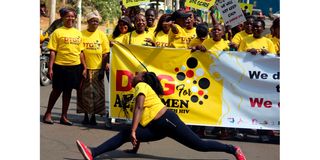One step forward, two steps back in struggle for safe abortion services

Activists take part in a peaceful demonstration in Nairobi in 2019 to demand better sexual and reproductive health services.
A total of 22 million women have unsafe abortions every year. In Kenya, more than 3,000 women and girls die yearly as a result of unsafe abortions. A 2018 study showed Kenya had spent more than Sh500 million on abortion-related complications.
Yet, a supportive legal environment has proved elusive. During the making of the 2010 Constitution, one of the most contentious provisions was on abortion, showing the intractable nature of the issue.
However, many human rights organisations continue to raise awareness of the risks of lack of access to safe abortion services. While successes elsewhere have kept hope alive, the recent US Supreme Court landmark decision overturning women’s constitutional right to abortion in Roe vs Wade is causing shockwaves in Africa, including in Kenya.
The Constitution explicitly permits abortion in certain circumstances—such as when the health of the mother is in danger or where it is permitted in any other law. It takes a progressive approach by making reference to reproductive health under Article 43 (1) (a), providing that everybody has a right to the highest attainable standard of health.
The country has also made big strides in recognising abortion as a right for survivors of sexual violence, through progressive court judgments. The High Court sitting in Malindi recently noted that medical practitioners are permitted to provide post-abortion care.
Perpetuates stigma
The Penal Code, however, still prescribes punishment for offences in relation to abortion services. That perpetuates the stigma associated with safe abortion services, which extends even to situations that are permitted under the law.
Medical practitioners are, thus, prohibited from providing the services. A recent Centre for Reproductive Rights study noted that, after the promulgation of the 2010 Constitution, 29 criminal cases had been filed in relation to the procurement of abortion in four counties.
Even with the steps to recognise safe abortion rights, Kenya has often given mixed signals regarding reproductive health services, especially in relation to abortion and the provision of comprehensive sex education.
Kenya adopted the Reproductive Health Policy in 2022, a few days after the overturning of the Roe v Wade decision. That was despite protests by the civil society over the language of the national policy, which, though recognising abortion, requires the medical practitioner to balance the rights of the mother and the unborn child before aiding an abortion—a classic Catch-22 situation.
Further, it only recognises the provision of reproductive health products and accessories—including the use of contraceptives—only to married couples and ignores the alarming rates of HIV/Aids among the youth.
Counties have also developed reproductive health-related legislation which somehow limits the reproductive health of survivors. Among them, the Kilifi County Act and the Makueni Act either fail to recognise abortion or, if they do, squeeze the limit further than provided under the Constitution.
Besides, Kenya still places a reservation to Article 14 (2) (c) of the Maputo Protocol (Protocol to the African Charter on Human and Peoples’ Rights on the Rights of Women in Africa), which recognises that states are mandated to protect safe abortion services for survivors of sexual violence and incest.
Kennedy Mukulia Ayason, a member of the East African Legislative Assembly from South Sudan, sponsored the East African Sexual and Reproductive Health (SRH) Bill. It recognises reproductive health not only for women but also boys and men, the elderly and persons living with disabilities.
It also has provisions on menstrual health and the corresponding need for water, sanitation and hygiene (WASH) services and calls for prevention, information and formal education against unintended pregnancies and gives adolescents a second chance at education after pregnancy. It also takes a stand against harmful traditional practices, such as FGM.
The Maputo Protocol also has expansive provisions on reproductive health, including the right to self-protection from sexually transmitted infections such as HIV/Aids, showing the need for contraception services.
Policymakers at both the national and county levels must ensure that the laws embrace international human rights standards and further adopt gender-responsive budgeting to ensure universal access to quality reproductive health services.
Ms Mohamed ([email protected]) is the director, Africa Office, Equality Now. Dr Akol ([email protected]) is the regional director, Ipas Africa Alliance.



